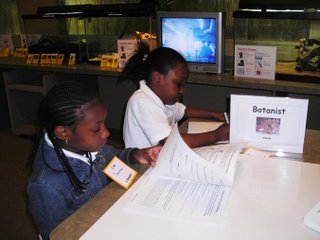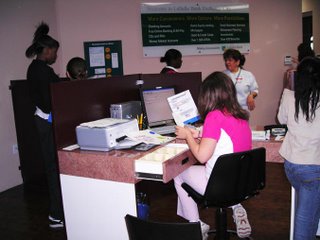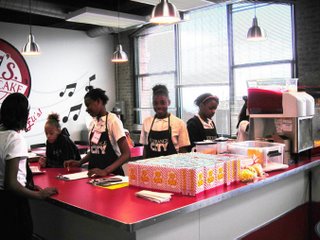I forgot to set the alarm clock, but that’s not that big a deal. The sun hits my window at just that correct angle and it makes eye contact with my brain. I never stay in bed when I wake. I always get up and do all the things anyone who teaches school has to do—shave, wash up, etc. OK.
So far so good.
The weather report could not have been better. When I walk outside at 5:45 AM, the sun is already rising, the sky is already blue, and I feel good with the world.
I always come to school an hour to an hour and a half before it starts. I like the
quiet. I like the peace. I like the solitude.
For the next hour or so, I write a poem, revise another, print some material and prepare my classroom for both reading and science class. During science, we are going to cut open a
full grown pig's stomach. I purchased a few at the butchers and they have been in my freezer waiting for this big day. I lay out the stomachs on the back science table, prepare my desk for the morning’s school business, and eat some breakfast. (I never eat at home. I walk four miles to school each morning and it doesn’t quite work out if I eat before I walk.)
I go outside to assist on the
playground at 8:30. I don’t have to go outside, but I do. It’s quiet, two men--a teacher's aide and a janitor--are standing near the fence away from the children, a pick-up basketball game is going on, children are all over the playground equipment, but there—over by the wooden playground equipment—something is getting ready to happen.
Sometimes you can just
smell it.
I walk over there. One adult is standing behind the equipment, but she cannot see this. Two boys, not very big, but big for second and third grade, are getting ready to
tussle. They make all of the appropriate motions, their chests and heads play the part of the nonverbal communication. Nothing has to be said. Suddenly students from all over are running because they know.
I break it up. It’s not hard because even though they are very large for their age (they are already five feet tall), they are still primary grade students. One of them runs in the other direction. I don’t know who started it and I don’t care—I take the one who has started many playground fights. He’s not happy, but I can talk to him. When I tell him to smile, he changes from an angry child to an ordinary child. (I wonder why he doesn’t smile more often—but then I know too much about his family’s background.)
We are walking towards the school when the other boy runs up on him, hauls back with all of his might, and it’s only because I move the boy I am restraining to the side, that the punch doesn’t cause
serious damage. I realize immediately that I will have to stop this other child—and I do.
I grab him by the arm and he fights me. He actually fights me. But that’s OK. This is part of my life. This is part of my job. I know for sure when I have him restrained, he will calm down, probably start to cry, and then we can find out what is really going on.
This does not happen.
He starts
cursing me and
hitting me—one time to the chest, a second time, a third—and he’s
cursing and threatening to bring everyone of his relatives on me. He yells out to everybody on the playground that I’m dead meat. His mama's going to kill me. His father is going to slice me up. He himself is going to knock the color right off my skin. He must use the N word twenty times. He threatens and threatens and then he hauls back to swing and he hits me again and again and again. I don’t hit him back. I don’t even knock him down. I don’t say a word. I just hold onto his arm and walk him into the school where he continues to yell and threaten and curse and the front office calls the police on him.
Here’s the interesting part. When the police arrive, he swings on the woman police officer. She can’t lose it either, but she can take him into a private office and give him a talking to.
I go back to the playground.
It’s like nothing has happened.
The boy’s grandfather comes, I receive a police report, and then I go to my class. It’s nice in my class. Quiet. My students are ready to study. I feel good. OK, not perfect, but good. One glitch doesn’t destroy a day.
An hour and a half later I have a girl from another room in my class because she walked out of her room and they put her in my room. One of my students who talks up a storm and does not do all of his work—and I give him a zero for one part—decides a zero gives him the
license to curse me and the class out. Another student who does little to no work who decides to grab his paper-his-mother-has-to-sign out of my hand to toss in the garbage can. I have a classroom of children who think this is the funniest thing they ever saw.
I begin to reprimand my class—I begin to lose it. I start thinking about the class rules, how I consider the class family--and the principal walks in.
My day is me on a mountain skiing downhill, losing control, going downhill way too fast and then a child cuts in my way and I can't remember how to stop or turn.
During recess, one of the girls placed with me from another room trips on the asphalt, comes down hard and doesn’t get up. Oh, she does eventually, but not before she scares the hell out of me. An eighth grader sneaks out of his room and comes out to play. I have to send someone in to get him off the playground.
Then we’re back in the room. I have the seventh graders and we’re getting ready to cut open the full grown pig’s stomach. A fight breaks out in another class. Both end up in my room. The teacher down the hall sends a note to me asking for help. Three students will not stay in the room. The substitute next door complains about students throwing things at her. "Hey," she says, "I'm a sub. I'm supposed to take abuse." Another child in need of discipline is sent to my room.
Then I get my break. My preparation period. I pass out progress reports. I take the intermediate science genius group from other classrooms and we do a chemistry experiment. The first part works; the second is a great failure. I pass out field trip permission slips when my class comes back to me right before dismissal. I have been told not to give a slip to one of my girls. I don’t. Next thing you know my students is climbing the stairs to curse the teacher out. I’m sure that will change the teacher’s mind.
And now the principal wants to meet with me. It’s important. Can you come see me before you leave?
I can’t leave. I have to vent. I have to get all of this out of my system. I have to—you get the point.
I have to go home because this is a
horrible, horrible, terrible day.



